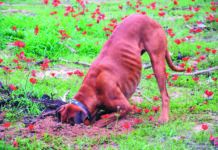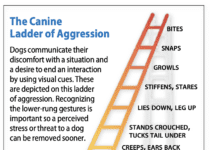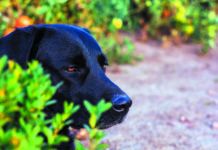[From Tufts April 2012 Issue]
This is an occasional column by best-selling author Nicholas Dodman, BVMS, DACVB, director of the Animal Behavior Clinic at Cummings School.
A few years back, a concerned owner brought his 9-month-old castrated male schnoodle called Ozzie to see me at the Animal Behavior Clinic. Ozzie, he reported, had begun exhibiting some rather weird behaviors when he was only 6 months old. First, there is what is called stargazing behavior, in which Ozzie would suddenly freeze and stare upward at the ceiling. Then this might be interrupted by a bout of fly-snapping behavior — the same as if he were snapping at flies, except none are present. Some people describe this behavior as snapping at imaginary flies.
In between bouts of stargazing and fly snapping, Ozzie would appear to be looking for things that weren’t there, sniffing the ground, licking his lips or sometimes licking his flank or objects around the house. This behavior occurred in bouts or fits, and during one of these turns, he appeared totally switched on or hyperactive.
Does My Dog Have A Congential Problem?
As Ozzie was young, we suspected some kind of congenital problem and agreed with the referring vet’s suspicion that Ozzie may have a liver shunt — a condition in which blood from the intestines bypasses the liver and is thus not properly processed before entering the general blood circulation. That initial surmise did not pan out, however, as Ozzie’s physical exam showed absolutely no abnormalities, stunting of growth, or anything else that may go along with having a shunt. In addition, his blood work was unremarkable.
Ozzie’s owner, however, remained curious about whether a shunt could be properly ruled out by such observations and testing, and we informed him that the definitive test was a nuclear scan, which he agreed to have performed. The nuclear scan was also negative so Ozzie conclusively did not have a shunt. “So, what’s going on?” we all pondered.
The next possible diagnosis to consider was that it could be a form of obsessive-compulsive disorder (OCD). Numerous textbooks and scientific articles describe fly snapping as a compulsive disorder and stargazing, searching and repetitive licking have also been roped into this diagnosis. Personally, however, I was inclined toward a different diagnosis — one of partial seizures in which anomalous activity in certain brain regions causes any number of bizarre outward expressions, depending on the precise locus in which mini electrical brainstorms are occurring.
These various hypotheses aside, what we had to do was treat Ozzie’s condition and alleviate his problem. To do this, I made some background changes, increasing his daily exercise level, enriching his environment and advising his owner to pay him no attention while he was engaging in such bouts — just in case Ozzie’s behavior was somehow being reinforced as an attention-getting behavior. Medication-wise, I prescribed the human anti-Alzheimer’s drug memantine (Namenda), as this medication is effective in both OCD and seizures by attenuating the action of the brain’s principal excitatory neuro-transmitter, glutamate.
Over the next few weeks, Ozzie had good days and bad days. His improvement ranged from 50 to 75 percent better, but there were still days when he was as bad as before. Nevertheless, his owner thought things were better and decided that this line of approach was something he was happy to adhere to. The only problem was that the memantine was very expensive, and he asked if there was a less expensive alternative.
Medication for Dog OCD
We informed him that there was, and that it is the substance often found in cough mixtures called dextromethorphan. We weren’t quite as confident that dextromethorphan would be as good as memantine but had nothing to lose from trying the switch. After changing to dextromethorphan, Ozzie still suffered occasional episodes of stargazing and other repetitive behaviors, but things generally were a good deal better.
“Bad Ozzie days” occurred if he was stressed by something; for example, when his owners tried to get him to traverse a cat walk at a harbor in Florida, he panicked and for a few days afterward engaged in a considerable amount of stargazing. Another time, after Ozzie came home from being boarded, he experienced stargazing episodes for three weeks straight. This latter episode set him back so much that he never got back to the level of improvement he was exhibiting before the boarding experience.
I decided to try one last medication, a herbal product called huperzine-A, which is an extract of Chinese club moss. Huperzine has been shown to have powerful anti-convulsant effects in laboratory animals, and we had some early evidence that it also worked in dogs. It can also be reasoned that it should be effective in OCD, as huperzine, like memantine, blocks glutamate.
After initiating this final attempt to get Ozzie’s behavior under control, I waited with baited breath for another message from Ozzie’s owner. A month later, the message arrived in form of an e-mail. The owner wrote, “Huperzine has transformed this dog and helped way beyond the dextromethorphan. He’s becoming noticeably more normal by the day; almost gone is the spontaneous stargazing. He seems more relaxed and able to enjoy affection without being needy. Now he will sit on the patio, stare into the distance and act like a (normal) composed dog. The restlessness is virtually gone. I report this because aside from being delighted, you should know how remarkable Ozzie is from this new supplement. We feel quite fortunate to have tried it.”
Needless to say, we were also delighted by this wonderful outcome and pondered huperzine’s efficacy and potential value for treatment of other conditions similar to the one Ozzie exhibited. Sure, we’ll never quite know whether Ozzie was suffering from OCD or partial seizures — I still favor the latter interpretation — but what I do know for certain is that huperzine is a valuable addition to our pharmacological armamentarium and will likely help many other dogs in the future.





I have a shihtuz that just started do all of the same your dog doing.can u tell me what I can do to help my little dog its so sad.is their any home remedy I can do.glad ur dog is fine